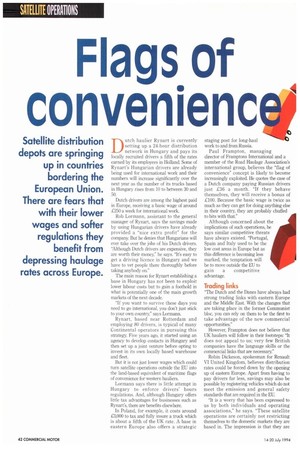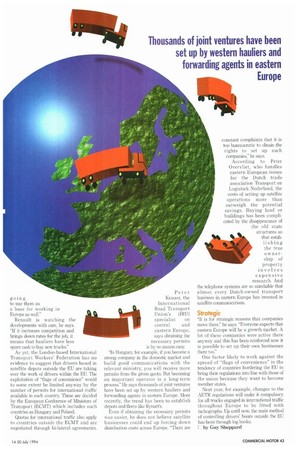Flags of convenienc
Page 44

Page 45

If you've noticed an error in this article please click here to report it so we can fix it.
Satellite distribution depots are springing up in countries bordering the European Union. There are fears that with their lower wages and softer regulations they benefit from depressing haulage rates across Europe.
Dutch haulier Rynart is currently setting up a 24-hour distribution network in Hungary and pays its locally recruited drivers a fifth of the rates earned by its employees in Holland. Some of Rynart's Hungarian drivers are already being used for international work and their numbers will increase significantly over the next year as the number of its trucks based in Hungary rises from 10 to between 30 and 50.
Dutch drivers are among the highest paid in Europe, receiving a basic wage of around £250 a week for international work.
Rob Lormann, assistant to the general manager of Rynart, says the savings made by using Hungarian drivers have already provided a "nice extra profit" for the company. But he denies that Hungarians will ever take over the jobs of his Dutch drivers. "Although Dutch drivers are expensive, they are worth their money," he says. "It's easy to get a driving licence in Hungary and we have to vet people there thoroughly before taking anybody on."
The main reason for Rynart establishing a base in Hungary has not been to exploit lower labour costs but to gain a foothold in what is potentially one of the main growth markets of the next decade.
"If you want to survive these days you need to go international, you don't just stick to your own country," says Lormann.
Rynart, based near Rotterdam and employing 80 drivers, is typical of many Continental operators in pursuing this strategy Five years ago, it started using an agency to develop contacts in Hungary and then set up a joint venture before opting to invest in its own locally based warehouse and fleet.
But it is not just lower wages which could turn satellite operations outside the EU into the land-based equivalent of maritime flags of convenience for western hauliers.
Lortnann says there is little attempt in Hungary to enforce drivers' hours regulations. And, although Hungary offers little tax advantages for businesses such as Rynares, there are benefits elsewhere.
In Poland, for example, it costs around £3,000 to tax and fully insure a truck which is about a fifth of the UK rate. A base in eastern Europe also offers a strategic staging post for long-haul work to and from Russia.
Paul Frampton, managing director of Framptons International and a member of the Road Haulage Association's international group, believes the "flag of convenience" concept is likely to become increasingly exploited. He quotes the case of a Dutch company paying Russian drivers just £36 a month. "If they behave themselves, they will receive a bonus of £100. Because the basic wage is twice as much as they can get for doing anything else in their country, they are probably chuffed to bits with that."
Although concerned about the implications of such operations, he says similar competitive threats have always existed. "Portugal, Spain and Italy used to be the low cost areas in Europe but as this difference is becoming less marked, the temptation will be to move outside the EU to gain a competitive advantage.
Trading links
"The Dutch and the Danes have always had strong trading links with eastern Europe and the Middle East. With the changes that are taking place in the former Communist bloc, you can rely on them to be the first to take advantage of the new commercial opportunities."
However, Frampton does not believe that UK hauliers will follow in their footsteps: "It does not appeal to us; very few British companies have the language skills or the commercial links that are necessary," Robin Dickeson, spokesman for Renault VI United Kingdom, believes distribution rates could be forced down by the opening up of eastern Europe. Apart from having to pay drivers far less, savings may also be possible by registering vehicles which do not meet the emission and general safety standards that are required in the EU, "It is a worry that has been expressed to us by both individuals and operating associations," he says. "These satellite operations are certainly not restricting themselves to the domestic markets they are based in. The impression is that they are going to use them as a base for working in Europe as well."
Renault is watching the developments with care, he says. "If it increases competition and brings down rates for the job, it means that hauliers have less spare cash to buy new trucks."
As yet, the London-based International Transport Workers' Federation has no evidence to suggest that drivers based in satellite depots outside the EU are taking over the work of drivers within the EU. The exploitation of "flags of convenience" would to some extent be limited anyway by the number of permits for international traffic available in each country These are decided by the European Conference of Ministers of Transport (ECMT) which includes such countries as Hungary and Poland.
Quotas for international traffic also apply to countries outside the ECMT and are negotiated through hi-lateral agreements. Peter Krausz, the International Road Transport
Union's (1RU)
specialist on central and eastern Europe, says obtaining the necessary permits is by no means easy. "In Hungary, for example, if you become a strong company in the domestic market and build good communications with the relevant ministry, you will receive more permits from the given quota. But becoming an important operator is a long-term process." He says thousands of joint ventures have been set up by western hauliers and forwarding agents in eastern Europe. More recently, the trend has been to establish depots and fleets like Rynart's.
Even if obtaining the necessary permits was easier, he does not believe satellite businesses could end up forcing down distribution costs across Europe. "There are
constant complaints that it is too bureaucratic to obtain the rights to set up such companies:. he says. According to Peter Overvliet, who handles eastern European issues for the Dutch trade association Transport en Logistiek Nederland, the costs of setting up satellite operations more than outweigh the potential savings. Buying land or buildings has been complimted by the disappearance of the old state structures so that establishing the true ownership of property involves expensive research. And the telephone systems are so unreliable that almost every Dutch-owned transport business in eastern Europe has invested in satellite communications.
Strategic
"It is for strategic reasons that companies move there," he says. "Everyone expects that eastern Europe will be a growth market. A lot of these companies were active there anyway and this has been reinforced now it is possible to set up their own businesses there too."
One factor likely to work against the spread of -flags of convenience" is the tendency of countries bordering the EU to bring their regulations into line with those of the union because they want to become member states.
Next year, for example, changes to the AETR regulations will make it compulsory for all trucks engaged in international traffic throughout Europe to be fitted with tachographs. Up until now, the main method of controlling drivers' hours outside the EU has been through log books.
II by Guy Sheppard




























































































